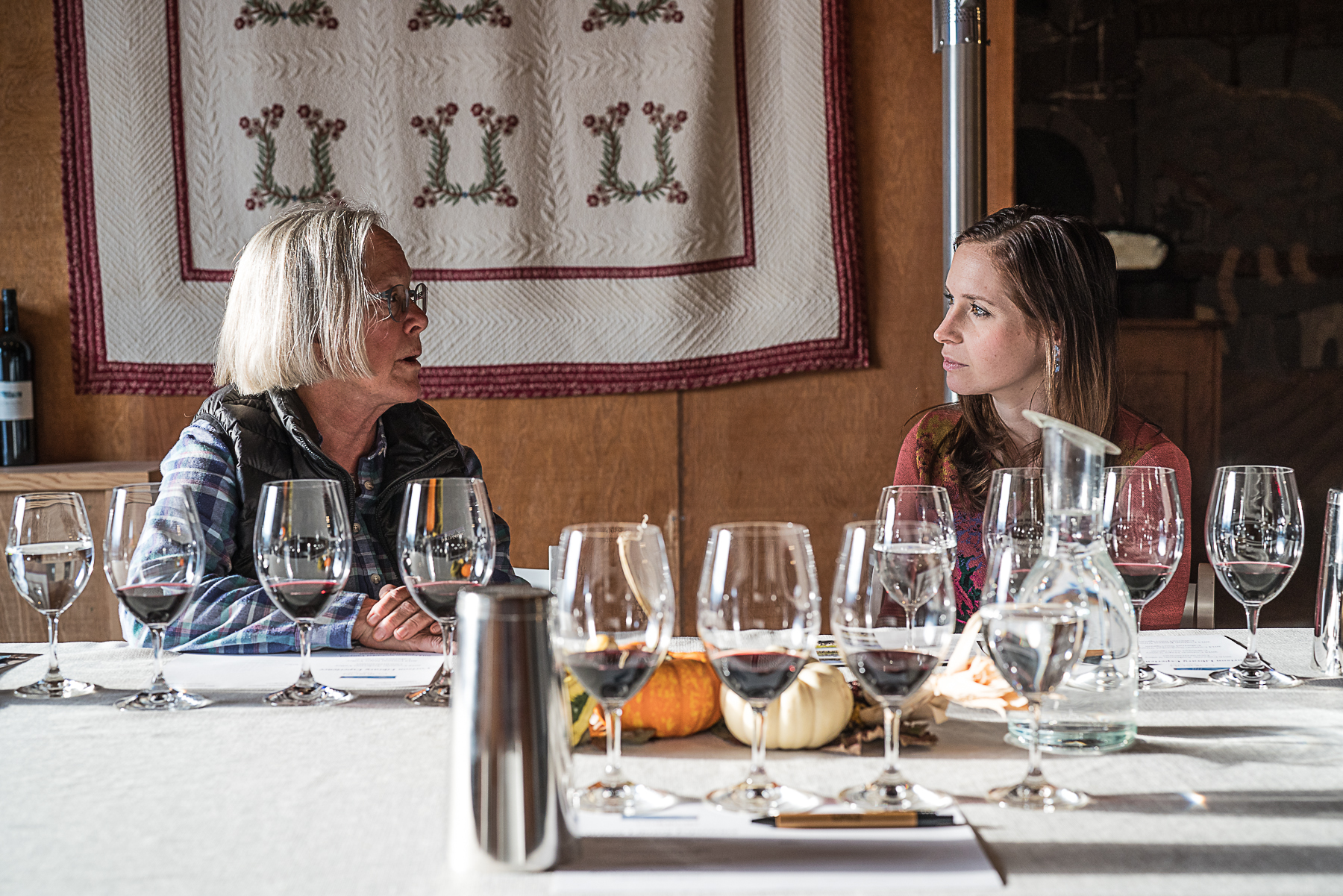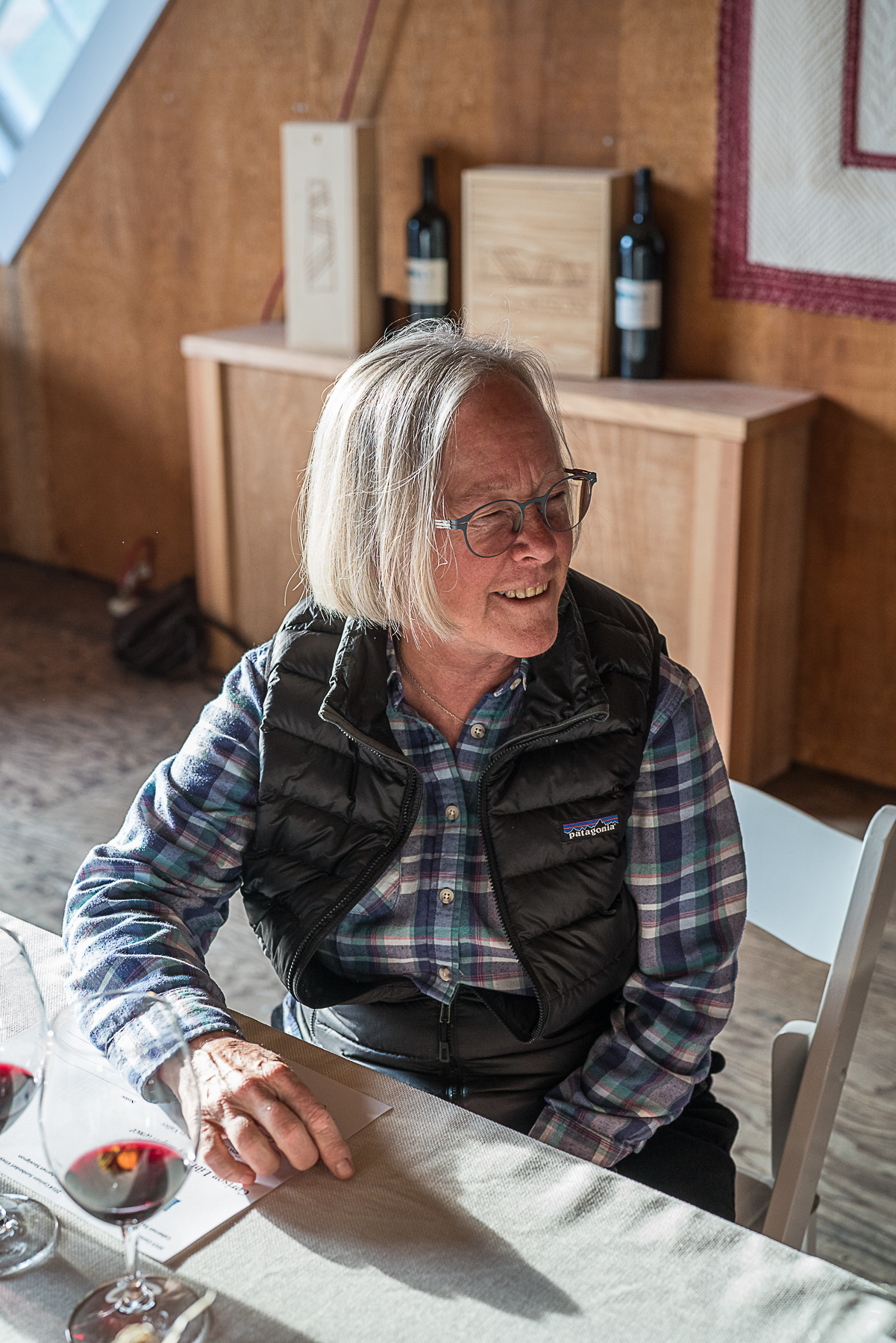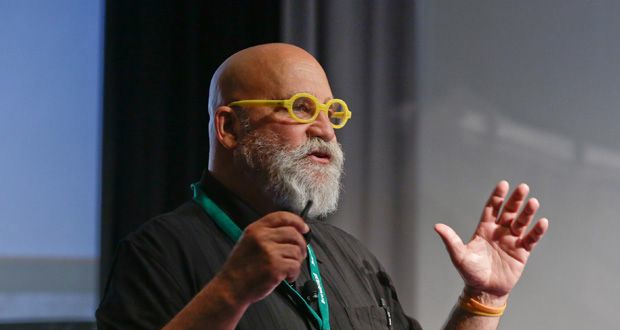Cathy Corison was a true champion and pioneer of Napa Valley, decades before it was known as the iconic wine country getaway that it’s famous for today. As a dedicated owner, vintner and viticulturist at Corison Winery, Cathy started out with little experience but a whole lot of passion, and a determination to be one of the best wine makers in the valley, regardless of gender.
The wine world was a man’s world—a female oenophile was unheard of. Cathy was denied an internship two times before finally landing the gig due to her perseverance. Where others would have given up, she powered through. Where opportunity seemed impossible, she made her own opportunities. Cathy Corison is the very definition of a self made woman with an extremely admirable work ethic, while raising a family and producing some incredible artisanal Cabernet Sauvignons.
We had the pleasure of visiting Cathy in the tasting room that was built by her husband, overlooking her gnarled vines, sipping sunshine and waxing poetic about everything from hauling hoses to what it takes to break into an industry the way she has done. Perseverance, a little hard headedness, and a lot of wine.
Jenna Bostock: Tell me about this vineyard, how did you find such an incredible property?
Cathy Corison (gesturing to vines): All the great wines for a hundred years have come from this. It’s just all right here, and I’ve spent most of my adult life making Cabernet from this little corner of the world. It came to a point in our little business where we were debt free and the economy was in bad shape. It was the mid ‘90’s. The market changed a lot between the ‘70’s and the ‘90’s, but then fast forward to now, a property would never sit on a market.
I sent my husband out looking for loam soil, which is only 2% of the Napa Valley.
He looked and looked and a lot of it is up against the hills with trophy homes on it. That wasn’t an option for us. He came home a few weeks later and said, “You know that place on the highway that’s been for sale forever?” It had just been sitting for eight years. Those were very different days. We were told that the house was condemned, but my husband fixed it up just fine.
Jenna Bostock: How has the valley changed since the ‘70s?
Cathy Corison: It has changed a lot since the Paris tasting. That’s over 40 years ago. It’s a very different place. It was very rural in those days and even a little bit redneck around the edges.
Like everything in life it’s been mixed. I mean, this much growth brings good things and bad things, but it brought a lot of focus to Napa. I think and lot of resources and that’s good. As long as we’re all still farmers, we’re going to be making good wine.
Jenna Bostock: When did you first realize you were interested in wine making?
Cathy Corison: I was minding my own business, studying biology at a little tiny school in Southern California, and on a complete whim, I took wine appreciation class. I had been teaching a trampoline class before that—you cannot make this stuff up. I put my name at the top of the wine appreciation class list, I had no intention of doing it but we were there, waiting for people to come in and sign up. Wine grabbed me by the neck and I never look back. Two years later, I graduated. Two days later, I was in Napa.
I grew up in Suburban California. My dad was a lawyer, his sisters too. There’s no explaining this. Women didn’t make wine in those days and frankly, the wine business was just scratching its way out of prohibition. Prohibition ended in ’33 but the wine business had suffered through two world wars, a depression, and prohibition. And it was in shambles.
Napa was famous in the late 19th century for Cabernet-based wines. They were winning expositions in Europe. But between the wars and prohibition and the depression, it was not until the mid ’60’s that Napa started to claw its way out. And then, I got here in the mid ’70’s and it was just starting to explode. It was a really exciting time to be here.
Jenna Bostock: It was a predominantly male industry.
Cathy Corison: And it still is. We scratched our way all the way up to 13% of the full control winery country in Napa. It’s a double edged sword. I’ve always said that I think that we stuck out like sore thumbs, you know. So, for better or worse, everybody noticed what we did.
There have been a lot of very, very intelligent women winemakers over the last couple of decades. I’m always been grateful that the title “winemaker” has no gender.
I just keep my nose down and focus on the wine.
Jenna Bostock: What were some of the bigger obstacles you had to handle?
Cathy Corison: Oh, it took me two years to get my first internship in 1978. There had never been a woman hauling hoses in Napa Valley before that year. I tried to do it in ’77, but I weighed about 90 pounds in those days and the winemaker there wasn’t sure I could do the work.
I took a day off school one time and came over here and we did a practice racking and in those days, hoses were 10 times heavier and the pumps were way heavier. And we became convinced that physically it was no problem at all. I had always been very athletic. So the winemaker offered me the job, only to have to take it away when the owners wouldn’t have a woman.
They said there would never be a woman in a cellar. Ever, in Napa Valley. So I just went back and finished my degree. But the winemaker hired me the next year and finally I did my internship at Freemark Abbey in 1978. The best part of the story for me is that there were four owners and one of the owners that black-balled me the first year, he got me my first wine-making job after that internship. I don’t like to tell the horror stories because there’s usually a flip side.
Jenna Bostock: Tell me about the sort of wine you wanted to make, and how that helped to launch your career.
Cathy Corison: It’s a big question. I just wanted to make wine. It’s just who I am. There was this wine inside of me that needed to get out.
I love the wines of the world and this wine was a Cabernet that was both powerful and elegant. They sound like opposites but they can be in the same glass at the same time. I wanted to make wines that spoke of place and grace the table and age beautifully. The place I have to go to make this wine that was in my head was down here to the bench land, back on those days it was just called the Rutherford bench.
I didn’t have as much money as anybody around me but I needed to make wine without compromise. I basically started to buy grapes and barrels instead of cars and houses as a young adult. I used other people’s facilities. I did the work but I would use their facilities and I did that until 1999 when we built this place. I’ve paid top dollar for the best grapes. I’ve paid top dollar for the best barrels but it was all done without brick and mortar and without vineyards.
It was really started very organically. There was never any going to the bank and saying, “I want to make two thousand cases and I need all these tanks and I need to buy land and I need to buy a building or build a building.” It wasn’t like that at all. It was just as a very young adult, I had this wine I needed to make. It was kind of a very new paradigm.
Jenna Bostock: Would you say the wine industry was particularly difficult to break into?
Cathy Corison: Well, I learned as I went. I knew how to make the wine but the memo I didn’t get was the one about business. The wine business is an extremely difficult one. What business person in their right mind would buy something today that they couldn’t sell, needs to keep inventory for three to twenty years, then you say you still can’t sell, but you go back and do it again!
Things changed when Don Chappellet let me takeover. How old was I? 24 or something? He handed over a 30,000 case winery to me. By then I had wines to show.
Frankly the business was expanding so fast that there weren’t enough little old white guys or big old white guys left. I mean, there just weren’t enough. A lot of us, regardless of gender, had amazing opportunities right out of school because the industry was expanding so fast.
It was absolutely perfect timing, and then just paying attention. It’s been a wonderful ride.
Jenna Bostock: For our readers who are interested in pursuing their passion or getting into entrepreneurship, do you have any words of caution or encouragement?
Cathy Corison: Mostly encouragement. If you’re doing it for the right reason and you’re passionate, regardless of what you want to do, just start walking. People get paralyzed wanting to be sure they make exactly the right moves, when in fact you just start walking. You don’t know what’s gonna happen at each fork in the road. You don’t know what those forks are gonna be. But if you don’t start walking, you won’t get anywhere.
If anybody had told me that I would own a winery or that Napa Valley Cabernet would be a world-class famous wine in the world in my lifetime, I would tell them they were nuts when I first started.
Jenna Bostock: What is an essential wine making element to you?
Cathy Corison: There are a lot of things you can put your thumb on that are important. I’ve been trying to articulate something for a couple of years and I’m getting a little better at it. The wines I love are the wines that have energy and life force and vibration.
Jenna Bostock: How do you get that energy into your own wine?
Cathy Corison: I pick much earlier than most here in the valley because I value good natural acidity. I value that red and blue end of the Cabernet spectrum. (again this following sentence is a bit confusing) Cabernet can make, red cherries and blue blueberries and through the plums and cassis going to purple and then black blackberries. And the best vintages, and the most interesting to me, are the ones where that’s all there at the same time.
That’s one of the goals for me. Complexity is a big piece of it, this just sort of brightness. And then — I can’t really describe it very well — it really is energy; a certain life force.
Jenna Bostock: What are your thoughts on the growth of Corison?
Cathy Corison: People ask me all the time, “What’s next?” and they’re expecting me to get bigger or do something new. I just want to get better.
I can’t think of any examples in the wine business really where getting bigger benefits the wine. It might be better for a lot of things but not better for the wine. My fear is retiring. I just want to make wine.
Jenna Bostock: So how does the average customer find out about you?
Cathy Corison: Hm, average customer? Probably restaurants. That’s always been my marketing strategy from the very beginning. Somehow I had a sense for getting on the right wine lists across the country, and these days it’s across the world. There’s a lot of exposure in the right place and the right associations, so I can sell one case of wine at a really fine restaurant that’s got a big wine list, it may not move very fast but it’s great exposure.
I embraced social media when it first happened. Twitter made my head hurt for months but I got pretty good at it and I still do some Twitter. I do a lot more Instagram now. I’m trying to figure Instagram out cause it’s so different. Facebook I’ll never understand. Somebody said, “Oh you gotta figure out Twitter to get to the millennials.” I figured I’d go look, and very quickly what it did is it plugged me into the palms in the world and the wine writers in the world.
And now, they’re my friends. That changed everything hugely. I didn’t do that deliberately, it’s because they’re my people. They’re the people that — that love the same things I love, and speak the same language.
Jenna Bostock: Any last words for anyone looking to start their own business?
Cathy Corison: Be passionate. There are people that are passionate about wine and then there are people that there’s a prestige associated with wine and I think, you’ve gotta have the passion.
The prestige thing is okay if you’ve got the passion because that’s the only thing that’s gonna pull you through it all. Cause it’s not an easy business, it’s a very difficult business. It looks very shiny from the outside. It was so funny, back when I use to consult, I would always try to talk people out of the wine business. I felt that was my first job.
People get stars in their eyes. People can’t see straight. And then a few years into it, they’re like the war wounded.
Jenna Bostock: Do you have any urge to retire anytime soon?
Cathy Corison: None. I want to be making wine when I’m 99.





